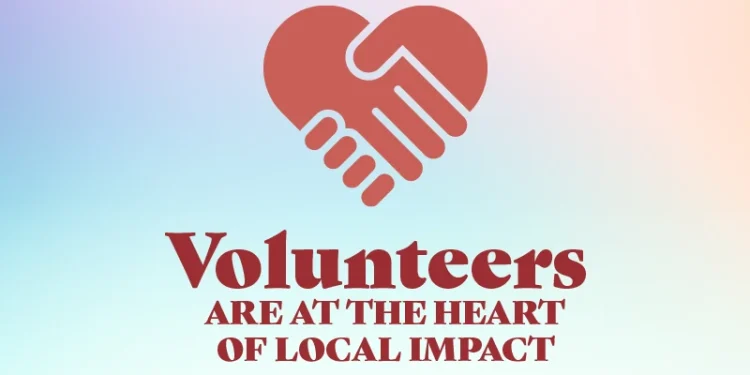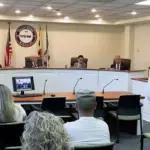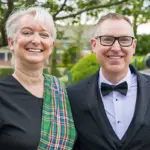by Lois Szymanski, photography by Nikola Tzenov
Volunteers Are at the Heart of Local Impact
We often think of philanthropy as making financial contributions that help others. Some organizations, however, exist only because they have committed volunteers who give their time and knowledge.
According to the U.S. Bureau of Labor Statistics, on an average day in 2022, more than 11 million people volunteered in some manner across the country. In Carroll County, the heart of local impact beats strong through the hands-on work of volunteers who give their time, experience and effort.
Whether tutoring students, organizing food drives or caring for public spaces, they are the force that makes impactful programs possible. Carroll County’s volunteers demonstrate that service, in its many forms, is as valuable as any financial donation, weaving a network of support that uplifts our community.
Boys & Girls Club of Carroll County
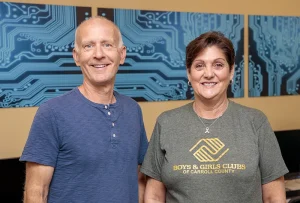
“Volunteers are the lifeblood” of the Boys & Girls Club of Carroll County, says Marketing Director Erin Bishop.
After the school day ends, kids pour into the center to do their homework, use the computer lab or games room and spend time in a positive environment with access to various programs and activities.
Bishop says that last year, the Boys & Girls Club of Carroll County worked with about 810 volunteers, including local college students, at its five locations around the county.
Craig Sarsony, senior vice president of global operations at the Global Fund for Women, volunteers at the Boys & Girls Club several times a week.
“In the summer, I volunteer with Garden Club,” he says. “A couple of times a week, they go to a community garden and learn about aspects of maintaining a garden. They prepare the soil, plant the seeds, weed and water the plants.
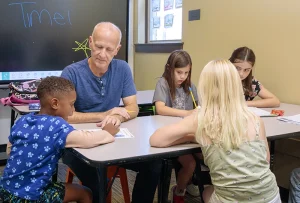
Sarsony works with the students through the growing process, which means practicing patience while they wait for the plants to grow. They get to harvest their garden, and at the end of the year, they let the plants go to seed so they can harvest the seeds for the next year. During the school year, he helps kids of all ages who participate on the Run Team become better runners, and he helps students with homework and other needs that arise.
Sarsony says getting to know children and helping them in activities that support them in various ways is rewarding. While volunteering is work, he has a good time doing it as there are often opportunities to participate in activities that are also his hobbies. He enjoys playing the piano, baking, gardening and running. He has recently been learning to practice yoga.
“Volunteers come in and share their knowledge and experience with our kids and give them an opportunity to explore all aspects of life,” Bishop says. “We are making a positive impact on kids in our communities with crucial leadership skills and diverse opportunities, and our volunteers help us do that.”
Sarsony says he finds touching moments at unexpected times. For example, two months after planting the garden, a child came running to him enthusiastically to say the tomato plant he took home had tomatoes on it.
“It’s their excitement,” he says. “It’s a beautiful facility with so many activities for the children. There’s something for everybody.”
“He is a wonderful role model, a coach, a mentor and an example of leadership for the kids to look up to,” Bishop says. “They look forward to seeing him. He builds personal relationships, trust and connections with the kids. It’s such an important part of what kids need.”
Bridginglife Hospice
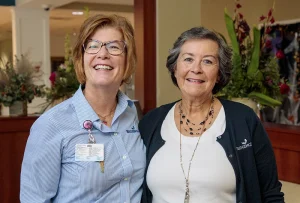
BridgingLife (formerly Carroll Hospice) in Westminster improves the quality of life for patients needing end-of-life care. Its services allow patients to live as fully and comfortably as possible with palliative care, pain and symptom management, and family support.
Being a hospice volunteer requires a special kind of person — not just someone comfortable dealing with and speaking about death but also willing to undergo significant training.
“Through Medicare, it’s mandatory that 5% of our care comes from volunteers, but it’s about so much more than that,” BridgingLife Volunteer Manager Kathy Barna says. “Our volunteers must have a minimum of 16 hours in training.”
Carla Bell believes that her many years of teaching experience help her work at the Dove House, BridgingLife’s inpatient hospice center, where she has volunteered for 16 years.
“When I go to Dove House, it is always a learning experience,” Bell says. “Like teaching, it’s another place where you have to meet people where they are.”
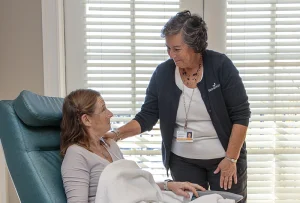
She says she is willing to do anything necessary for those in her care.
“I sit with any patient who doesn’t have family with them, and I offer family members a chance to take a break while I sit with their loved one,” Bell says. “Other times, they just might need to talk about what they are going through. It helps them be a little bit more prepared for what might happen. You try to give people a little bit of courage to make it through.”
Bell says she volunteers for many reasons, including the opportunity to work with such a dedicated staff.
“They are my friends, and I want to help them through tough times, too. I have been going there long enough that I have gotten to know everyone,” she says. “They are like family.”
Barna says hospice volunteers provide invaluable care at a critical time. She considers Bell to be one of the best.
“She is empathetic, kind, serving and giving,” Barna says. “It takes a special person and a special calling for someone to volunteer in this environment. She considers it an honor to work hand in hand with patients who are at the end of their journey in life and their families.”
Westminster Rescue Mission
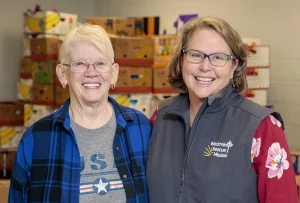
“Last year, we moved a million pounds of food in our food program,” Westminster Rescue Mission Engagement Manager Trish St. Michel says. “There is no way we could do this without volunteers.”
The Westminster Rescue Mission uses volunteers in two areas: the addiction healing program and the food mission program. Georgia Rittmeyer volunteers weekly in the food program.
“People who volunteer know they are helping to put food on the table of hungry people,” St. Michel says. “Georgia is as regular as clockwork. She knows the program in and out, and she’s also one of our downstream partners.”
Now retired, Rittmeyer worked for the U.S. Department of Defense for nearly 50 years. She loves spending time with her two daughters and three grandchildren. Most of all, she calls herself a “kitchen junkie.”
“I love to try out new recipes and love cooking shows and competitions,” she says. “My favorite thing in the world is feeding people, whether guests in my home, small catering opportunities or at a community meal or the soup kitchen.”
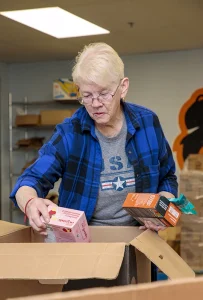
Rittmeyer is committed to volunteering to ensure people have access to food. She has volunteered at the Rescue Mission for eight or nine years, first cooking for residents in the addiction healing program. Now she sorts food to be picked up by the Maryland Food Bank and other community partners.
“I go through things donated by grocery stores and separate them into categories,” Rittmeyer says. “We also have farmers who bring fresh vegetables or fruits, and I prepare those.”
Rittmeyer runs a food program at St. Paul’s United Church of Christ, where individuals can receive a free midday community meal every Thursday.
“They helped me so much with food for the St. Paul’s kitchen that I feel I need to give back and help as much as I can,” she says of volunteering for the Rescue Mission. “I wish I could do more. I believe that people who are benefiting — partners like myself — should be expected to give a few hours a week.”
Rittmeyer says she loves running into residents she’s worked with at the Rescue Mission and has attended their graduations from the organization’s program.
“All the people at the Rescue Mission are incredible,” Rittmeyer says. “I feel blessed and honored to be able to work with them. I love what they do and what they have made it into. Without volunteers, it [the work] would not get done.”
The Arc of Carroll County
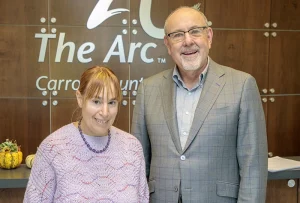
The Arc Carroll County sprang from the roots of volunteerism.
“We were founded on volunteerism in the 1950s,” Executive Director Don Rowe says. “When the founding parents [who had children with disabilities] looked around, they found there were no good options for their children. They didn’t want a state-run institution. They wanted something community-based. So, they volunteered their time and started this organization.”
The Arc champions and supports individuals with developmental disabilities, offering help with housing, employment and support services. Rowe says that moms, dads and family members volunteered to run the organization for many years.
While The Arc enjoys the support of many volunteers, Rowe points to one person who is ideally suited for the work.
“I think I have been there 10 years now,” Erica Wheeler says. “Having a disability myself, I can relate. I grew up with and went to school with many of [the clients], and we did Special Olympics together.”
Rowe says Wheeler, secretary of The Arc Carroll board of directors, is a self-advocate who comes in weekly to work with individuals who want to better advocate for themselves.
“She’s done a lot over the years,” he says. “She’s been on the board of Special Olympics. She helped spearhead a voter registration seminar here and volunteers at our golf tournaments and holiday parties.”
For Wheeler, volunteering and advocating for individuals with disabilities is a big part of her life. She’s been a Special Olympics athlete for 31 years and a coach for almost four years. She participates in swimming, kayaking, tennis and pickleball. In addition, she is a big supporter of McDaniel’s women’s soccer team.
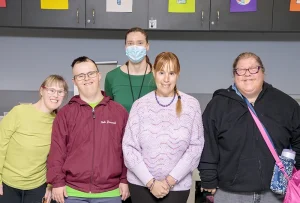
Rowe notes that Wheeler’s efforts impact individuals and families beyond Carroll County. She is a volunteer board member with the Ethan Saylor Alliance, a statewide effort to train first responders on how best to work with people with disabilities, and she goes to Annapolis every year for the statewide Developmental Disabilities Day.
“She speaks with legislators and the delegation about our platform and our initiatives for the year, and she works to try to gain their support,” Rowe says.
Wheeler believes she relates to her clients and is impactful because she can speak from her personal experience.
“On Maryland Disability Day in Annapolis, I go with the clients, and they speak to our legislators. They have to speak for themselves, something they learned in the self-advocacy group. It is one of my favorite things.”
For Wheeler, volunteering is at the heart of her service to others.
“It is the joy that I see on their faces,” she says. “They are getting to know me and to know I am making a difference. They know I grew up here, and I can relate to them. People should volunteer and get to know the people in their community. Just because some are different, we are still all the same.”
Carroll County Food Sunday
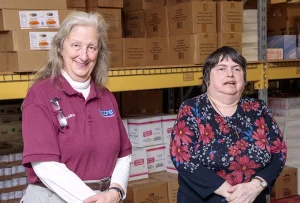
Carroll County Food Sunday serves food seven times a week in Westminster, Taneytown and Eldersburg in support of more than 500 local families.
“We have more than 70 volunteers serving food,” Executive Director Caroline Babylon says. “Our operational costs are extremely low because we only have two part-time paid employees. Volunteers are the hands and heart of our operation.”
Stephanie Dean volunteers at Carroll County Food Sunday three mornings a week. She is one of two volunteers who arrive promptly at 8 a.m., performing various tasks, such as assessing food needs and stocking shelves.
“To have someone who comes in and knows what she needs to do and gets right to work … someone who doesn’t need guidance or instruction and is welcoming to others, that is invaluable,” Babylon says of Dean.
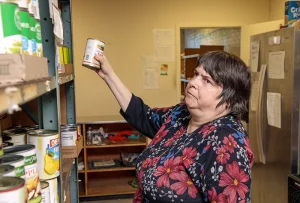
While Dean deals with severe anxiety, it doesn’t stop her from volunteering and spending time around others.
“It’s the people I work with,” she says. “I enjoy the job, and I am a people person. It’s working with the public, helping them, knowing their names and talking to them regularly. If they get something consistently, I remember, and they seem pleased.”
Dean’s own experience has motivated her to reach out to others who might also be dealing with anxiety or life’s many issues.
“I volunteer to give back,” she says. “I’m disabled, and I get disability benefits. I want to give back to the community that helps me … and people who are less fortunate.”
While Dean supports others through volunteering, she also feels that she benefits from her experience. “The people I work with are very kind. When my brother died, they were right there for me. When I had vertigo last year, they kept an eye on me. They are always here.”


